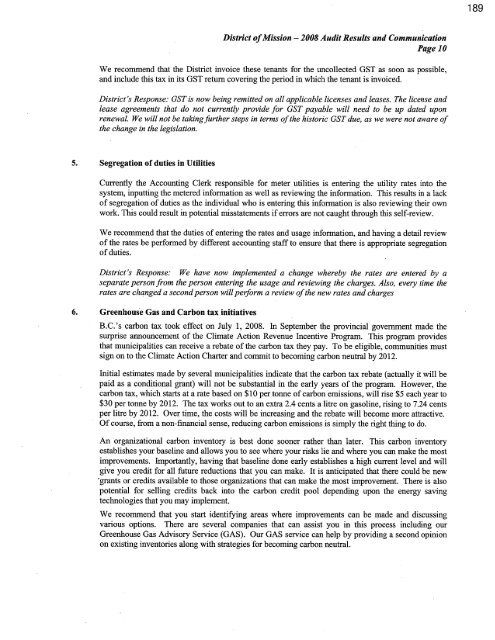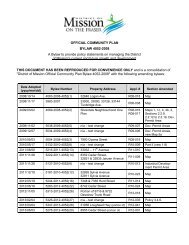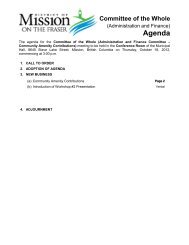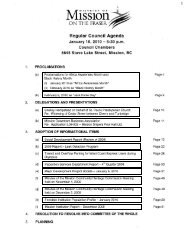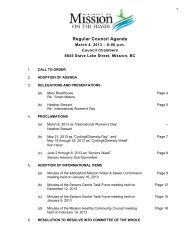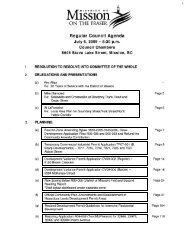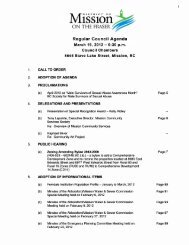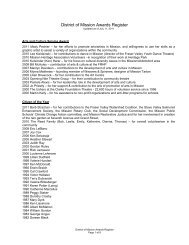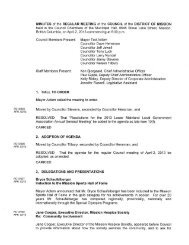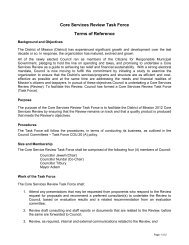June 15, 2009 - District of Mission
June 15, 2009 - District of Mission
June 15, 2009 - District of Mission
Create successful ePaper yourself
Turn your PDF publications into a flip-book with our unique Google optimized e-Paper software.
189<br />
<strong>District</strong> <strong>of</strong> <strong>Mission</strong> — 2008 Audit Results and Communication<br />
Page 10<br />
We recommend that the <strong>District</strong> invoice these tenants for the uncollected GST as soon as possible,<br />
and include this tax in its GST return covering the period in which the tenant is invoiced.<br />
<strong>District</strong>'s Response: GST is now being remitted on all applicable licenses and leases. The license and<br />
lease agreements that do not currently provide for GST payable will need to be up dated upon<br />
renewal. We will not be taking further steps in terms <strong>of</strong> the historic GST due, as we were not aware <strong>of</strong><br />
the change in the legislation.<br />
5. Segregation <strong>of</strong> duties in Utilities<br />
Currently the Accounting Clerk responsible for meter utilities is entering the utility rates into the<br />
system, inputting the metered information as well as reviewing the information. This results in a lack<br />
<strong>of</strong> segregation <strong>of</strong> duties as the individual who is entering this information is also reviewing their own<br />
work. This could result in potential misstatements if errors are not caught through this self-review.<br />
We recommend that the duties <strong>of</strong> entering the rates and usage information, and having a detail review<br />
<strong>of</strong> the rates be performed by different accounting staff to ensure that there is appropriate segregation<br />
<strong>of</strong> duties.<br />
<strong>District</strong>'s Response: We have now implemented a change whereby the rates are entered by a<br />
separate person from the person entering the usage and reviewing the charges. Also, every time the<br />
rates are changed a second person will perform a review <strong>of</strong> the new rates and charges<br />
6. Greenhouse Gas and Carbon tax initiatives<br />
B.C.'s carbon tax took effect on July 1, 2008. In September the provincial government made the<br />
surprise announcement <strong>of</strong> the Climate Action Revenue Incentive Program. This program provides<br />
that municipalities can receive a rebate <strong>of</strong> the carbon tax they pay. To be eligible, communities must<br />
sign on to the Climate Action Charter and commit to becoming carbon neutral by 2012.<br />
Initial estimates made by several municipalities indicate that the carbon tax rebate (actually it will be<br />
paid as a conditional grant) will not be substantial in the early years <strong>of</strong> the program. However, the<br />
carbon tax, which starts at a rate based on $10 per tonne <strong>of</strong> carbon emissions, will rise $5 each year to<br />
$30 per tonne by 2012. The tax works out to an extra 2.4 cents a litre on gasoline, rising to 7.24 cents<br />
per litre by 2012. Over time, the costs will be increasing and the rebate will become more attractive.<br />
Of course, from a non-financial sense, reducing carbon emissions is simply the right thing to do.<br />
An organizational carbon inventory is best done sooner rather than later. This carbon inventory<br />
establishes your baseline and allows you to see where your risks lie and where you can make the most<br />
improvements. Importantly, having that baseline done early establishes a high current level and will<br />
give you credit for all future reductions that you can make. It is anticipated that there could be new<br />
*grants or credits available to those organizations that can make the most improvement. There is also<br />
potential for selling credits back into the carbon credit pool depending upon the energy saving<br />
technologies that you may implement.<br />
We recommend that you start identifying areas where improvements can be made and discussing<br />
various options. There are several companies that can assist you in this process including our<br />
Greenhouse Gas Advisory Service (GAS). Our GAS service can help by providing a second opinion<br />
on existing inventories along with strategies for becoming carbon neutral.


